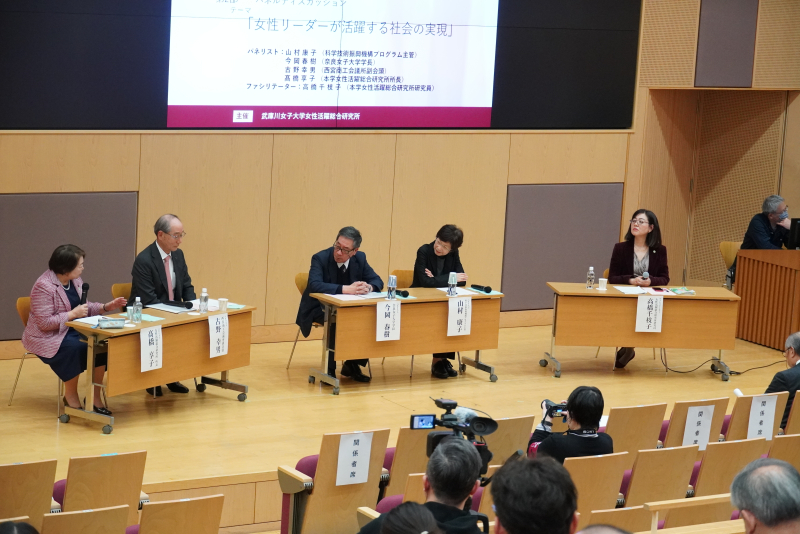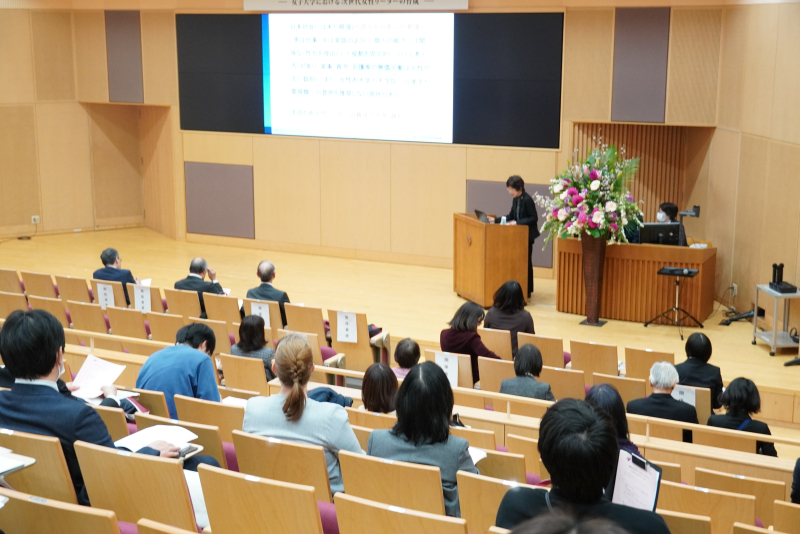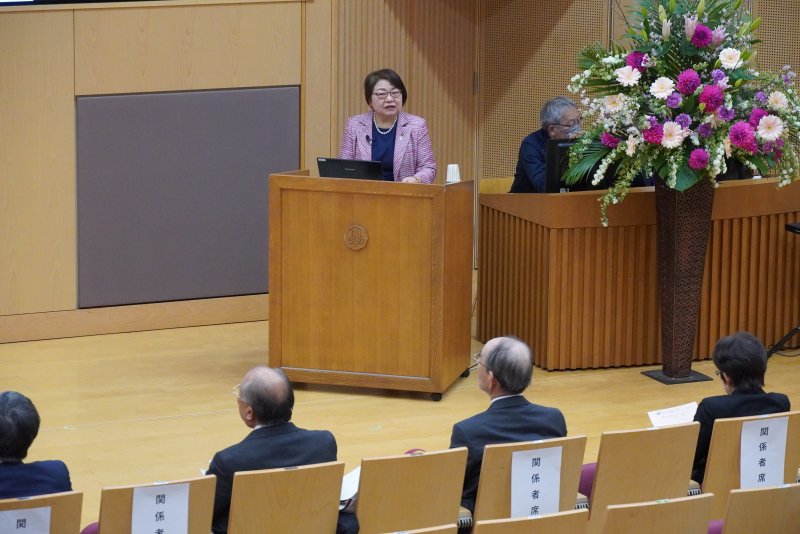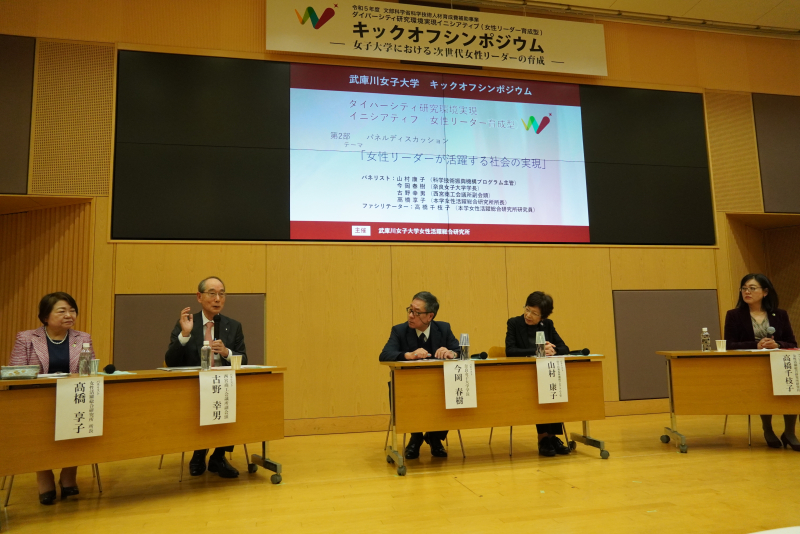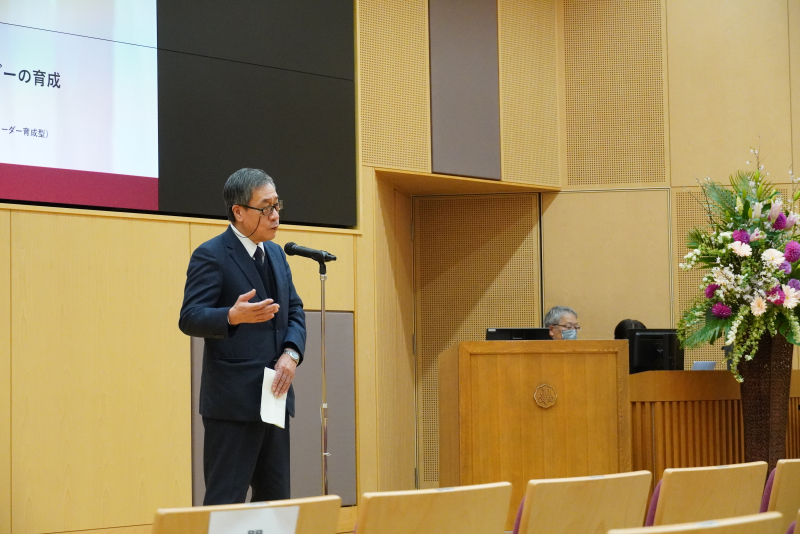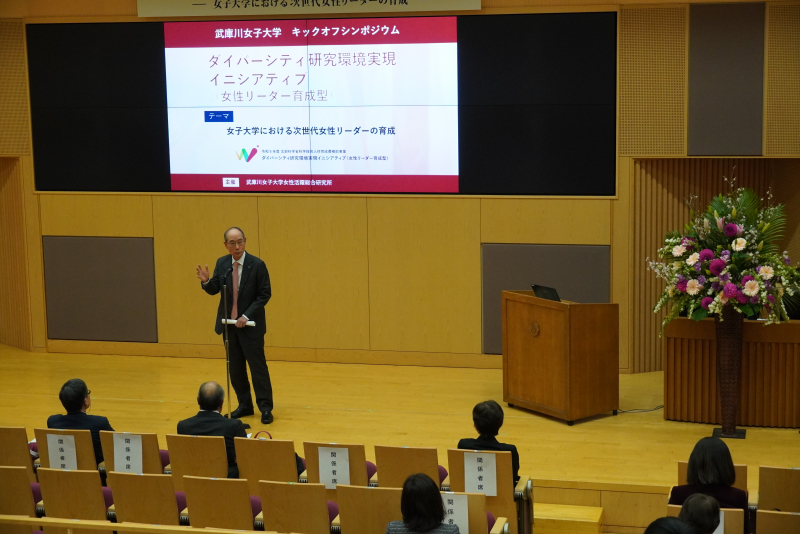ダイバーシティ研究環境実現イニシアティブ(女性リーダー育成型)キックオフシンポジウムを開催しました。
2024/02/20
English below.
武庫川女子大学が令和5年度文部科学省科学技術人材育成費補助事業「ダイバーシティ研究環境実現イニシアティブ(女性リーダー育成型)」取組機関として選定されたのを受け2月16日、中央キャンパスメディアホールでキックオフシンポジウムが開催されました。
私立大学で唯一、また、女子大学で唯一、機関選定された意義に鑑み、「女子大学における次世代女性リーダーの育成」に焦点をあて、基調講演とパネルディスカッションを実施しました。
第一部では、科学技術振興機構プログラム主管の山村康子氏と、本学女性活躍総合研究所の高橋享子所長が基調講演。山村氏は「日本が目指す女性リーダー育成」と題し、いまだ男女の役割分担意識が根強く、女性リーダーが育ちにくい状況を概観。大学教員では職階が上がるにつれ、女性が減っていく「水漏れパイプ現象」が起きているとし、女性リーダー育成を経営戦略として進めるうえで「アンコンシャスバイアス」が介在しない仕組みを作ることが重要であると指摘しました。
高橋所長は学長をトップとする女性研究リーダー育成推進センターを組織することや、女性研究者上位職を取組機関の6年間で29%から40%にするなど目標値を示し、「本プログラムで育成された多くの人材が他大学や企業などで男性研究者とともに活動し、リーダーシップを発揮して活躍されることを期待します」と意欲を示しました。
第二部のパネルディスカッションでは山村氏、高橋所長に加え、奈良女子大学の今岡春樹学長、西宮市を拠点に世界に展開する古野電気株式会社の古野幸男社長が登壇。経営学部の高橋千枝子教授がファシリテーターを務め、女性リーダー育成について様々な観点から議論を交わしました。
女性活躍が遅れている背景について、高橋享子所長は「まずは意識改革と女性のキャリアデザイン、ライフプランなどの教育が重要」とし、今岡学長は「女性割合が低すぎるとマイノリティの立場に挑戦する女性が出てこない」としたうえで、インド工科大学の例を挙げ、「女性の比率を一定程度に引き上げる施策が有効」と指摘しました。
古野社長は「最近は女性役員を一定割合まで登用するなど、産業界全体で従来の枠組み、考え方を変更する動きがある。実際、女性を引き上げないと会社のパワーが落ちるので、女性の活躍する場、仕組みづくりに各社とも積極的に取り組んでいる」と、企業の変化を語りました。
一方で、高橋千枝子教授が「学生の中にはリーダーになりたくない、という声も多い」と問題提起すると、山村氏は「かけ離れたロールモデルではなく、身近なモデルを見せることが必要」、今岡学長は「リーダーとリーダーシップを分けて考える必要がある。必要なのはリーダーシップ。目の前の課題を自分ごとととらえ、周りを巻き込んで推進する力を持つ人が増えるよう、環境づくりが大事」、古野社長は「男性でも管理職になりたくない人は増えている。ただ、新卒の女性でも意識の高い人がいて、そういう人には海外の子会社に出張させるなど経験を積ませている」、高橋享子所長は「女性教員は増えても運営側は男性が多い。女性にマネジメントする体験の機会を与えないと前に進まない。誰でもリーダーの資質があると思うので、グループワークでまとめ役をするなど、大学でこそ経験を積むべきだ」と呼び掛けました。
A kick-off symposium was held on 16th of February at the Media Hall on the central campus of Mukogawa Women's University, following its selection as an institution to take part in the 2023 Ministry of Education, Culture, Sports, Science and Technology (MEXT) Human Resources Development Grant Program "Diversity Research Environment Implementation Initiative (Female Leader Development Type)".
In view of the significance of being the only private university and the only women's university to be selected as an institution, a keynote speech and a panel discussion were held with a focus on the "development of next-generation female leaders at women's universities".
In the first part, keynote speeches were given by Ms. Yasuko Yamamura, Program Director of the Japan Science and Technology Agency, and Ms. Kyoko Takahashi, Director of the University's Institute for Women's Career Advancement and Gender Equality Development. Yamamura gave an overview of the situation in which it is still difficult to nurture female leaders due to a deep-rooted awareness of the division of labor between men and women, under the title 'Japan's aim to nurture female leaders'. She pointed out that a 'leaky pipe phenomenon' is occurring in which the number of women in university teaching positions declines as they move up the ladder, and that it is important to create a system that prevents 'unconscious bias’s from intervening when promoting the development of female leaders as a management strategy.
In the second part of the panel discussion, in addition to Yamamura and Takahashi, speakers included Haruki Imaoka, President of Nara Women's University, and Yukio Furuno, President of Nishinomiya-based Furuno Electric Co. Professor Chieko Takahashi of the Faculty of Business Administration acted as facilitator, and the participants discussed women's leadership development from various perspectives.
Regarding the background to the delay in women's advancement, Director Kyoko Takahashi said, "First of all, it is important to raise awareness and educate women on matters such as career design and life planning", while President Imaoka said, "If the proportion of women is too low, women who challenge minority positions will not appear".
President Furuno commented: 'Recently, there has been a move to change the conventional framework and thinking in the industry as a whole, such as the appointment of female directors up to a certain percentage. In fact, if women are not raised, the company's power will decline, so all companies are actively working on creating places and systems for women to play an active role", he said, describing the changes in the company.
The panel discussion continued with comments from the facilitator, Professor Takahashi in between adding her own experiences facing students and the challenges in promotion of leadership within them.

